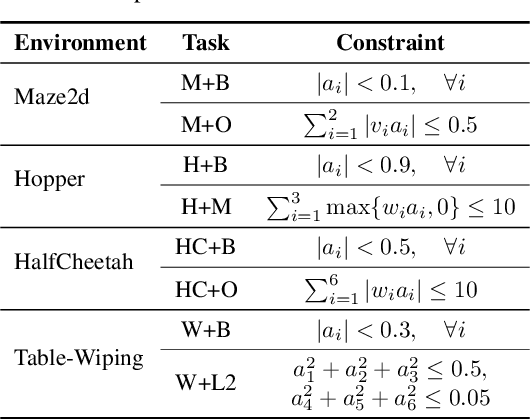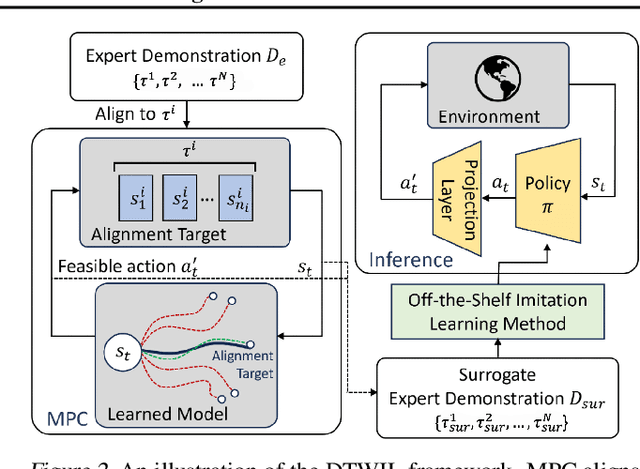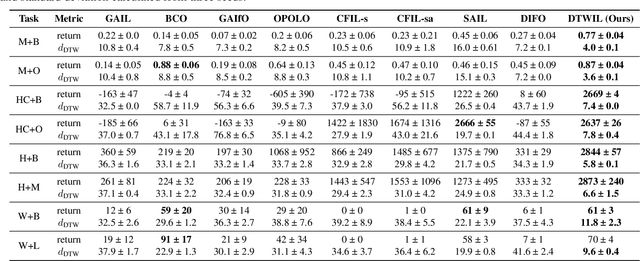Wei Hung
Action-Constrained Imitation Learning
Aug 20, 2025



Abstract:Policy learning under action constraints plays a central role in ensuring safe behaviors in various robot control and resource allocation applications. In this paper, we study a new problem setting termed Action-Constrained Imitation Learning (ACIL), where an action-constrained imitator aims to learn from a demonstrative expert with larger action space. The fundamental challenge of ACIL lies in the unavoidable mismatch of occupancy measure between the expert and the imitator caused by the action constraints. We tackle this mismatch through \textit{trajectory alignment} and propose DTWIL, which replaces the original expert demonstrations with a surrogate dataset that follows similar state trajectories while adhering to the action constraints. Specifically, we recast trajectory alignment as a planning problem and solve it via Model Predictive Control, which aligns the surrogate trajectories with the expert trajectories based on the Dynamic Time Warping (DTW) distance. Through extensive experiments, we demonstrate that learning from the dataset generated by DTWIL significantly enhances performance across multiple robot control tasks and outperforms various benchmark imitation learning algorithms in terms of sample efficiency. Our code is publicly available at https://github.com/NYCU-RL-Bandits-Lab/ACRL-Baselines.
Efficient Action-Constrained Reinforcement Learning via Acceptance-Rejection Method and Augmented MDPs
Mar 17, 2025Abstract:Action-constrained reinforcement learning (ACRL) is a generic framework for learning control policies with zero action constraint violation, which is required by various safety-critical and resource-constrained applications. The existing ACRL methods can typically achieve favorable constraint satisfaction but at the cost of either high computational burden incurred by the quadratic programs (QP) or increased architectural complexity due to the use of sophisticated generative models. In this paper, we propose a generic and computationally efficient framework that can adapt a standard unconstrained RL method to ACRL through two modifications: (i) To enforce the action constraints, we leverage the classic acceptance-rejection method, where we treat the unconstrained policy as the proposal distribution and derive a modified policy with feasible actions. (ii) To improve the acceptance rate of the proposal distribution, we construct an augmented two-objective Markov decision process (MDP), which include additional self-loop state transitions and a penalty signal for the rejected actions. This augmented MDP incentives the learned policy to stay close to the feasible action sets. Through extensive experiments in both robot control and resource allocation domains, we demonstrate that the proposed framework enjoys faster training progress, better constraint satisfaction, and a lower action inference time simultaneously than the state-of-the-art ACRL methods. We have made the source code publicly available to encourage further research in this direction.
Enhancing Offline Model-Based RL via Active Model Selection: A Bayesian Optimization Perspective
Feb 17, 2025Abstract:Offline model-based reinforcement learning (MBRL) serves as a competitive framework that can learn well-performing policies solely from pre-collected data with the help of learned dynamics models. To fully unleash the power of offline MBRL, model selection plays a pivotal role in determining the dynamics model utilized for downstream policy learning. However, offline MBRL conventionally relies on validation or off-policy evaluation, which are rather inaccurate due to the inherent distribution shift in offline RL. To tackle this, we propose BOMS, an active model selection framework that enhances model selection in offline MBRL with only a small online interaction budget, through the lens of Bayesian optimization (BO). Specifically, we recast model selection as BO and enable probabilistic inference in BOMS by proposing a novel model-induced kernel, which is theoretically grounded and computationally efficient. Through extensive experiments, we show that BOMS improves over the baseline methods with a small amount of online interaction comparable to only $1\%$-$2.5\%$ of offline training data on various RL tasks.
Q-Pensieve: Boosting Sample Efficiency of Multi-Objective RL Through Memory Sharing of Q-Snapshots
Dec 06, 2022Abstract:Many real-world continuous control problems are in the dilemma of weighing the pros and cons, multi-objective reinforcement learning (MORL) serves as a generic framework of learning control policies for different preferences over objectives. However, the existing MORL methods either rely on multiple passes of explicit search for finding the Pareto front and therefore are not sample-efficient, or utilizes a shared policy network for coarse knowledge sharing among policies. To boost the sample efficiency of MORL, we propose Q-Pensieve, a policy improvement scheme that stores a collection of Q-snapshots to jointly determine the policy update direction and thereby enables data sharing at the policy level. We show that Q-Pensieve can be naturally integrated with soft policy iteration with convergence guarantee. To substantiate this concept, we propose the technique of Q replay buffer, which stores the learned Q-networks from the past iterations, and arrive at a practical actor-critic implementation. Through extensive experiments and an ablation study, we demonstrate that with much fewer samples, the proposed algorithm can outperform the benchmark MORL methods on a variety of MORL benchmark tasks.
Escaping from Zero Gradient: Revisiting Action-Constrained Reinforcement Learning via Frank-Wolfe Policy Optimization
Feb 22, 2021



Abstract:Action-constrained reinforcement learning (RL) is a widely-used approach in various real-world applications, such as scheduling in networked systems with resource constraints and control of a robot with kinematic constraints. While the existing projection-based approaches ensure zero constraint violation, they could suffer from the zero-gradient problem due to the tight coupling of the policy gradient and the projection, which results in sample-inefficient training and slow convergence. To tackle this issue, we propose a learning algorithm that decouples the action constraints from the policy parameter update by leveraging state-wise Frank-Wolfe and a regression-based policy update scheme. Moreover, we show that the proposed algorithm enjoys convergence and policy improvement properties in the tabular case as well as generalizes the popular DDPG algorithm for action-constrained RL in the general case. Through experiments, we demonstrate that the proposed algorithm significantly outperforms the benchmark methods on a variety of control tasks.
 Add to Chrome
Add to Chrome Add to Firefox
Add to Firefox Add to Edge
Add to Edge